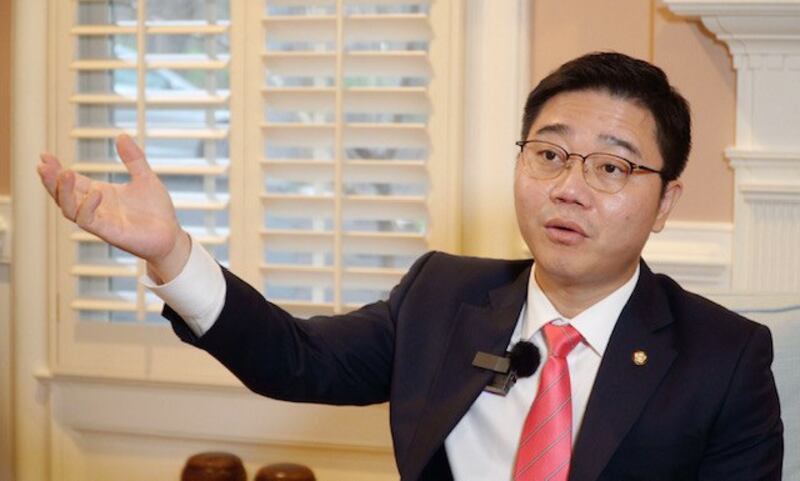Ji Seong-ho, a former North Korean refugee who is now a lawmaker in South Korea’s opposition People Power Party, is currently in the United States on a visit to discuss the North Korean human rights situation with government officials and policy makers.
During his visit, South Korea’s National Assembly passed a bill that made it illegal to release balloons into North Korean territory with payloads of leaflets critical of the North Korean leadership, an activity that opponents see as protected under freedom of expression laws.
Ji said that several congressmen and others that he met expressed deep concerns over the new law, as they feel it infringes not only on citizens’ freedom of speech, but it also North Korean citizens’ right to knowledge and freedom for Koreans on both sides of the border to practice their religion.
RFA’s Korean Service interviewed Ji Tuesday in Washington. This transcript has been edited for length and clarity.
RFA: During your visit here in the United States, you met with senior White House and State Department officials and federal lawmakers. What did you accomplish so far on this trip?
Ji: It was a time to shed new light on the North Korean human rights situation to the international community. Prior to my election to the National Assembly, I was an activist for North Korean human rights. As an activist, I always thought that we needed solidarity with the international community and go beyond our domestic activities.
Traveling was not easy due to the COVID-19 pandemic, but I could not pass up the invitation from the U.S. State Department. Also, these are people I met over the past 12 years as a North Korean human rights activist, and they welcomed me, now a lawmaker, just the same as they did before.
RFA: You met with Sam Brownback, the U.S. ambassador-at-large for international religious freedom. What did you talk about with him?
Ji: We talked a lot about human rights in North Korea. In particular, we discussed the new (South Korean) law that bans flying balloons carrying anti-North Korean leaflets, USB flash drives containing movies or the bible, and how all of this will now be stopped. From the perspective of North Koreans, there is no freedom in North Korea, and there is no freedom of religion. Some people are concerned to see that freedom of religion, in this case, sending bibles, is now banned because of the new law.
RFA: There has been a lot of criticism from human rights organizations in the U.S. regarding the new law. How did the government officials and lawmakers that you met react to news of this law?

Ji: They were all shocked. South Korea is a member of the OECD, a country in which democratic elections determine who leads our democracy, and a country that plays a role in conformity with international norms. It seems that those I met were shocked to see that our values based on the South Korean Constitution and the Universal Declaration of Human Rights are falling apart. That’s why many of the people I met are concerned.
RFA: In a statement, Congressman Chris Smith, whom you met, expressed his stern stance against the new law. In addition, Senator Chris Coons said he would convey concerns about the issue to President-Elect Joe Biden’s foreign policy transition team members. What do you think is the reason these lawmakers feel so strongly about this?
Ji: The U.S. and the international community are taking a serious view of North Korea. The human rights situation in North Korea is beyond terrible. We are well aware of the nature of North Korea, and North Korea hasn’t changed at all. It seems they are upset that activities that are the very least of our efforts in North Korea are now collapsing. When you think of the suffering North Korean people, this is a big problem.
RFA: Now that the law has passed in South Korea, what s are you planning to do when you return?
Ji: I have a lot of work to do when I get back. I don’t know whether the president will approve this law or send it back to the National Assembly. If it gets approved, I have to make a constitutional appeal. I will work for the basic rights of the people and for North Koreans’ right to knowledge, and I am going to come up with a revised bill… and I will continue to ask for cooperation from the international community.
RFA: Lastly, you became a member of the South Korean National Assembly and proposed a bill for North Korean human rights and for the settlement of North Korean refugees. You have helping North Korean refugees in South Korea with substantial societal changes. What are your feelings for this?
Ji: It was really difficult to transition into politics when I became a member of the National Assembly… However, the moment that policy that I made got passed in the plenary session, I felt that it was worth it. It was rewarding to know that I was able to change the system to be a help to many North Korean refugees, and this made me happy.
RFA: You mentioned that you are promoting the link between the international community and North Korean refugees to bring about human rights in North Korea. What specific plans do you have?
Ji: The U.S. is very interested in North Korean human rights issues, and funds made from American taxes are being used for North Korean human rights activities in South Korea. I want to expand the framework of these activities to include Europe. So, I want to try to make a lot of connections between North Korean refugees and countries there also. I think that would be helpful.
Reported by Jung Min Noh for RFA’s Korean Service. Translated by Leejin Jun. Written in English by Eugene Whong.
